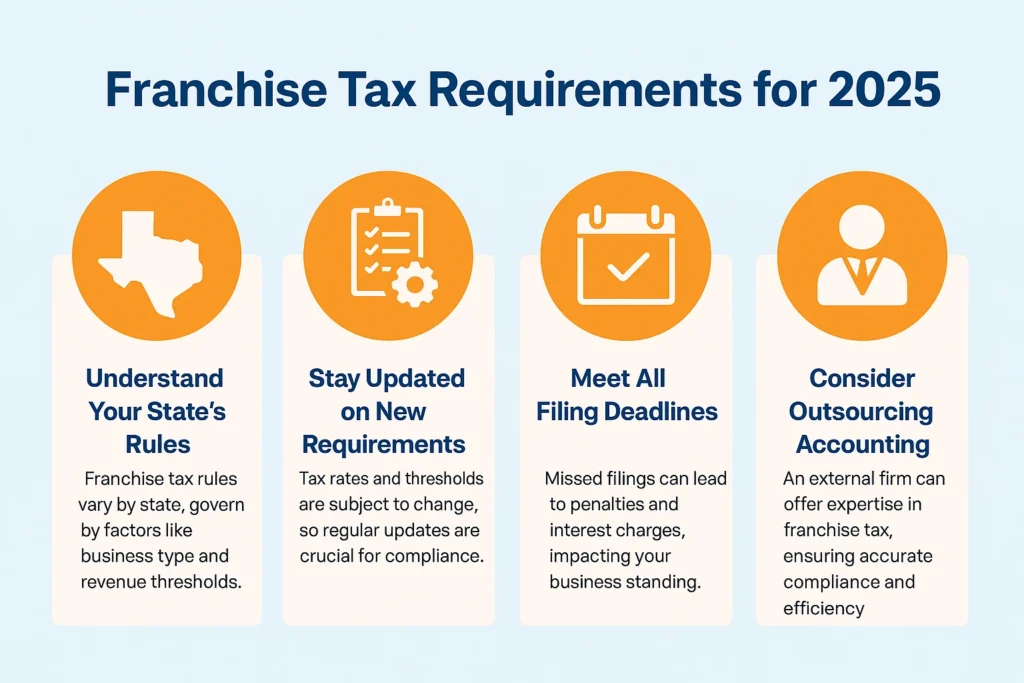Navigating franchise tax obligations is crucial for small businesses, startups, freelancers, and e-commerce ventures operating in the USA. As tax laws evolve, staying informed about the latest requirements ensures compliance and financial stability. This guide provides an updated overview of franchise tax requirements for 2025 and explores how outsourced accounting services can support your business.
Table of Contents
Understanding Franchise Tax
A franchise tax is a state-level levy imposed on businesses for the privilege of operating within a particular jurisdiction. Unlike income taxes, franchise taxes are not based on profit but may be calculated using various methods, including net worth, capital stock, or gross receipts. The specifics vary by state, making it essential to understand your state’s regulations.

State-Specific Franchise Tax Updates for 2025
Texas
- No Tax Due Threshold: For reports due on or after January 1, 2025, entities with annualized total revenue less than or equal to $2.47 million are not required to file a No Tax Due Report. However, they must still submit a Public Information Report (PIR) or Ownership Information Report (OIR).
- EZ Computation Eligibility: Entities with annualized total revenue of $20 million or less can opt for the EZ Computation method.
California
- Minimum Franchise Tax: LLCs, corporations, and S corporations are subject to an annual minimum franchise tax of $800.
- Annual Fee for LLCs: LLCs must pay an additional annual fee based on total income from California sources, with payments due by the 15th day of the 6th month of the current tax year.
New York
- Mandatory First Installment (MFI): Corporations with a tax liability exceeding $1,000 in the second preceding tax year must file and pay an MFI using Form CT-300.
- Estimated Tax Payments: Corporations expecting to owe more than $1,000 in franchise tax after credits must make quarterly estimated tax payments using Form CT-400.

Key Considerations for Small Businesses and Startups
- Entity Type Matters: Your business structure (LLC, S corporation, C corporation) influences your franchise tax obligations.
- Revenue Thresholds: Understand the revenue thresholds that determine filing requirements and tax liabilities in your state.
- Filing Deadlines: Stay aware of important filing dates to avoid penalties. For instance, Texas franchise tax reports are due by May 15 each year.
- State Variations: Each state has unique rules and calculations for franchise taxes. Regularly consult your state’s comptroller or tax authority for updates.
Benefits of Outsourced Accounting Services
Managing franchise tax obligations can be complex, especially for small businesses and startups. Outsourcing accounting services offers several advantages:
- Expertise: Access to professionals well-versed in state-specific tax laws and regulations.
- Time Savings: Free up valuable time to focus on core business activities.
- Accuracy: Reduce the risk of errors in tax calculations and filings.
- Compliance: Ensure timely and accurate submissions to avoid penalties.
- Scalability: Easily adjust services as your business grows or as regulations change.
How Profitjets Can Assist?
At Profitjets, we specialize in providing comprehensive outsourced bookkeeping and accounting services tailored to the needs of small businesses, startups, freelancers, and e-commerce ventures. Our services include:
- Franchise Tax Compliance: Ensuring accurate calculations and timely filings in accordance with state regulations.
- Financial Reporting: Providing detailed reports to help you understand your financial position.
- Tax Planning: Strategizing to minimize tax liabilities and optimize financial performance.
- Audit Support: Assisting during audits to ensure a smooth process.

Conclusion
Staying compliant with franchise tax requirements is essential for the success and longevity of your business. By understanding your obligations and leveraging outsourced accounting services, you can navigate the complexities of tax compliance with confidence.
Frequently Asked Questions
1. What is the difference between franchise tax and income tax?
Franchise tax is a fee for the privilege of doing business in a state, often based on net worth or capital, while income tax is based on a company’s profits.
2. Are all businesses required to pay franchise tax?
No, requirements vary by state and business structure. Some small businesses may be exempt based on revenue thresholds or entity type.
3. How can I determine my franchise tax obligations?
Consult your state’s tax authority or work with an accounting professional to understand specific requirements based on your business structure and revenue.
4. What happens if I miss a franchise tax filing deadline?
Missing deadlines can result in penalties, interest charges, and potential loss of good standing with the state.
5. How can outsourced accounting services help with franchise tax compliance?
They provide expertise, ensure timely filings, reduce errors, and allow you to focus on growing your business.






